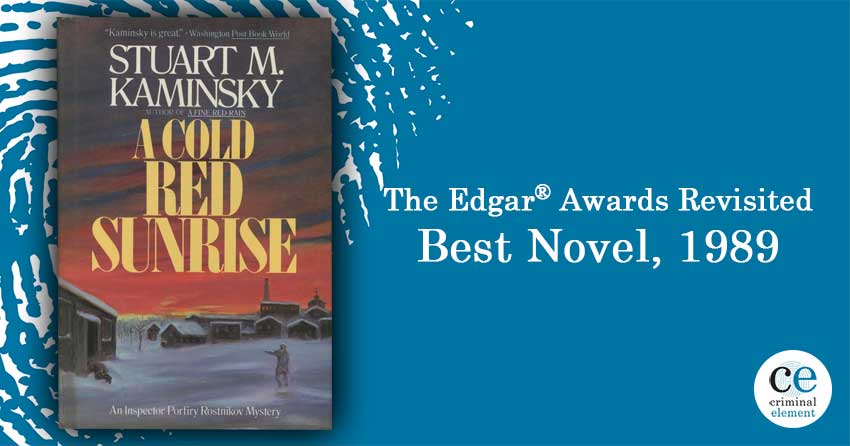The Edgar Awards Revisited: A Cold, Red Sunrise by Stuart Kaminsky (Best Novel; 1989)
By Martin Quinn
September 6, 2019“The name Siberia means “sleeping land” and for more than a thousand years while the rest of Europe and Asia were developing a history most of Siberia slept.”

In a time when Russian malfeasance on the global stage dominates our discourse, it’s refreshing to read a book that explores the humanity and tenderness of the Russian people. A Cold, Red Sunrise, the fifth in the Inspector Rostnikov series, takes place toward the end of the Cold War. Ordinary people are at the mercy of shifts in global politics, and no one in the novel quite knows where they stand and what their future holds. In a lazier novel, a litany of backstabbing and shifting alliances might be the focus. In Stuart Kaminsky’s Russia, basic morality takes center stage.
See More: Revisiting the Edgar Awards
After three decades with the Moscow police and some recent tussles with the KGB, Rostnikov is demoted and unceremoniously sent to Siberia to investigate the murder of Commissar Illya Rutkin, who was killed after being close to solving the murder of dissident Lev Samsonov’s daughter, Karla. Rutkin was stabbed through the eye with an icicle, one of the dozens of ways the frozen tundra figures into the plot. Accompanying Rostnikov is Inspector Emil Karpo, whose admiration and allegiance to Rostnikov conflicts with his assignment to monitor his behavior. He’s heard of and identified with Rostnikov’s battles for justice within the force.
Siberia makes for a claustrophobic drawing room-like setting. Lev Samsonov and his wife, Ludmilla, custodians Liana and Sergei Mirasnikov, Dimitri Galich—a creepy former priest—and militarist General Krasnikov are all quirky suspects: dissidents and ne’er-do-wells that have been banished to the deep freeze. But arguably the more intriguing mystery is whether Karpo is going to rat on Rostnikov, how he’s going to report on his sometimes questionable methods of investigation, and what awaits both of them when they arrive back in Moscow. The Communist Party dictates that they are adversaries, but because they’ve both been abused and demoralized by the Party, there’s a possibility that they will look out for each other in the face of a larger enemy.
At just over 200 pages, Kaminsky manages to convey the setting and time with depth and complexity. He devotes a few poetic paragraphs to the history of the country—Chapter Five begins, “The name Siberia means “sleeping land” and for more than a thousand years while the rest of Europe and Asia were developing a history most of Siberia slept.” But we learn more about what it’s like to live there through the plights of even minor characters. When Karpo infiltrates an ice cream stand at a fair to better spy on a criminal family, the owner of the ice cream business laments on how Karpo’s presence chases away customers, affects his business, his family, and his chance of survival. Earlier in the book, the shifting relationship between a brutish criminal and his sycophantic apprentice, one trying to outmaneuver the other over the course of a few pages, could be spun off into a separate book. One could wonder if Kaminsky was a Russian scholar or lived there for a while, but he lived in the Midwest all his life.
Kaminsky often wrote to make money; he published quick biographies on Clint Eastwood and Gary Cooper, and even penned CSI and Rockford Files tie-in paperbacks. Workhorse authors often rely on formula, but not Kaminsky. A Cold, Red Sunrise is not only a book deserving of an Edgar, but it’s also a mid-series standout that should lead you to the rest of Inspector Rostnikov’s adventures.
Fun Facts from the 1989 Edgar Awards:
-
The other nominees for Best Novel included A Thief of Time by Tony Hillerman, In the Lake of the Moon by David L. Lindsey, Joey’s Case by K.C. Constantine, and Sacrificial Ground by Thomas H. Cook.
-
Best First Novel went to Carolina Skeletons by David Stout. The other nominees were Elizabeth George (A Great Deliverance), Shelley Reuben (Julian Solo), Mary Lou Bennett (Murder Once Done), and J. Madison Davis (The Murder of Frau Shutz).
-
Best Short Story went to “Flicks” by Bill Crenshaw. The other nominees were “Bridey’s Caller” by Judith O’Neill, “Deja Vu” by Doug Allyn, “Incident in a Neighborhood Tavern” by Bill Pronzini, and “The Alley” by Stephen Wasylyk.
- The Thin Blue Line won Best Motion Picture, edging out A Fish Called Wanda, Die Hard, Masquerade, and Things Change.
-
Hillary Waugh served as the Grand Master.
- William Link was given the Ellery Queen Award.
- From one criminal gathering to the other, Bouchercon won the Raven Award.
Next week, tune in as bestselling author and two-time Edgar nominee Paul Doiron heads south to review Black Cherry Blues by James Lee Burke. See you then!
A special thanks goes out to The Mysterious Bookshop for donating many of the review copies of the award-winning books. For the latest on all new releases, as well as classic books for your collections, make sure to sign up for their newsletter.
Check Out 1988’s Winner: Old Bones by Aaron Elkins!
Comments are closed.

I want to win!